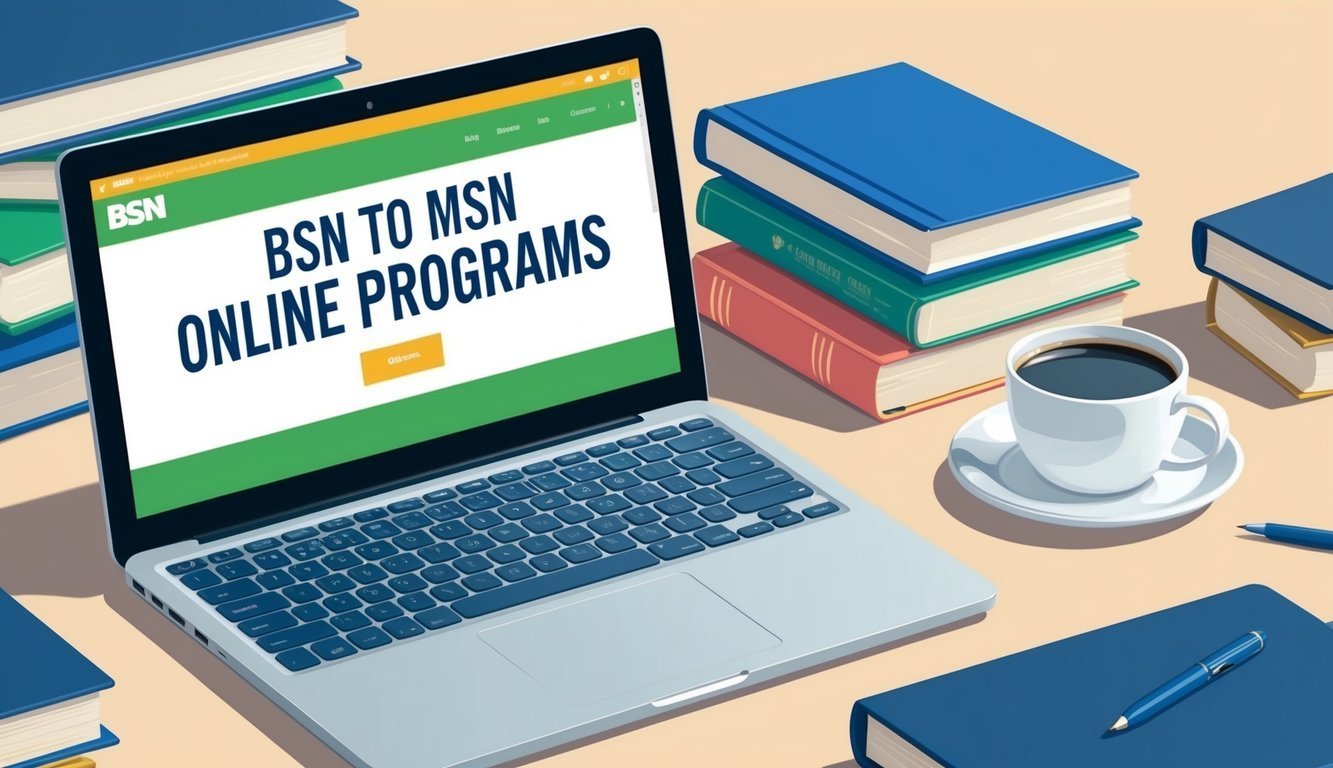Embarking on a journey from a Bachelor of Science in Nursing (BSN) to a Master of Science in Nursing (MSN) can significantly enhance your nursing education and career options. Online BSN to MSN programs allow you to advance your skills and expertise while balancing work and personal life. These programs are designed for registered nurses who seek to deepen their knowledge, specialize in areas like nursing practice, and unlock leadership opportunities in healthcare.
As you consider your options, it’s essential to understand the admission requirements and curriculum of various MSN programs.
Many universities offer flexible online formats, making it easier to gain hands-on experience through clinical training while learning from expert faculty.
This pursuit can open doors to advanced practice roles and higher positions in the nursing field, offering potential for career advancement.
Evaluating different universities and programs based on your career goals can help you make informed decisions.
By choosing the right online BSN to MSN program, you position yourself for success in a rapidly changing healthcare landscape.
Key Takeaways
- Online BSN to MSN programs provide flexible pathways for career advancement.
- Understanding admission criteria and curriculum is crucial for choosing the right program.
- Proper program selection can lead to enhanced opportunities in nursing leadership and practice.
Exploring BSN to MSN Online Programs
Choosing the right BSN to MSN online program is crucial for advancing your nursing career.
These programs offer various specializations and flexible learning options that fit your lifestyle.
Understanding the types of specializations available, the differences between online and on-campus options, and the importance of accreditation will help you make a well-informed decision.
Types of MSN Specializations
When pursuing a BSN to MSN online program, you can specialize in areas that align with your career goals.
Common specializations include:
- Family Nurse Practitioner (FNP): Focuses on providing care to individuals and families across all ages.
- Certified Nurse Midwife (CNM): Trains you to assist in childbirth and provide women’s health care.
- Adult-Gerontology Nurse Practitioner: Prepares you to care for adults and older adults with complex health needs.
- Nursing Informatics: Combines nursing practice with information technology to improve patient care.
- Nurse Administrator: Equips you with leadership skills to manage healthcare teams and organizations.
These specializations ensure you gain relevant knowledge for the specific area you want to work in.
Comparison of Online and On-Campus Programs
Both online and on-campus BSN to MSN programs have their benefits.
Here’s a comparison to help you decide:
| Feature | Online Programs | On-Campus Programs |
|---|---|---|
| Flexibility | High; fit studies around your schedule | Fixed schedule; must attend classes |
| Interaction | Virtual classrooms and forums | Face-to-face interactions |
| Location | Study from anywhere | Must commute to campus |
| Resources | Online libraries and support | Physical libraries and labs |
Online programs allow you to balance work and life while pursuing your degree.
On-campus options may offer more direct engagement with instructors and peers but require more time commitments.
Accreditation and Educational Standards
Accreditation is vital when selecting a BSN to MSN program.
Programs accredited by recognized organizations, such as the Commission on Collegiate Nursing Education (CCNE), meet high educational standards.
Key Points of Accreditation:
- Ensures quality of education.
- Enhances your degree’s value in the job market.
- May be necessary for licensure and certification.
Before enrolling, verify the program’s accreditation status.
This can affect your eligibility for federal financial aid and influence your employment opportunities.
Admission Requirements and Process
When pursuing a BSN to MSN online program, you must meet specific admission requirements.
Understanding these requirements can help streamline your application process.
Each program may have different expectations, so it is essential to verify details with your chosen school.
Prerequisites for Enrollment
To enroll in a BSN to MSN program, you need a Bachelor of Science in Nursing (BSN) from an accredited institution.
Additionally, you must hold a current, unrestricted registered nurse (RN) license.
Some programs also require a minimum GPA, often around 3.0, and prior clinical experience may be necessary.
You may need to complete a certain number of clinical hours or evidence of professional practice.
Check with your program for specific details on these requirements.
Application Materials Needed
When applying, you’ll need to gather several essential materials.
Typically, this includes:
- Official Transcripts: From all post-secondary institutions attended.
- Resume: Highlighting your professional experience and nursing credentials.
- Personal Statement: Explaining your career goals and reasons for pursuing an MSN.
- Letters of Recommendation: Preferably from employers or professors familiar with your nursing practice.
Ensure you carefully follow each program’s guidelines for submission.
For more details on admission processes, check NursingProcess.org.
Curriculum and Clinical Training
In pursuing a BSN to MSN online program, you will encounter a comprehensive curriculum designed to equip you with the necessary skills for advanced nursing roles.
Key components of your education will include core MSN courses, clinical experiences, and an emphasis on evidence-based practices.
Core MSN Courses
Core courses in an MSN program cover essential topics that prepare you for leadership positions in nursing.
Key subjects typically include:
- Nursing Theory: Understanding foundational theories that guide nursing practice.
- Advanced Health Assessment: Developing skills for comprehensive patient evaluations.
- Health Systems Management: Learning about healthcare systems, policies, and administration.
These courses are designed to enhance your clinical and critical thinking skills, enabling you to apply knowledge effectively in various healthcare settings.
By focusing on an evidence-based curriculum, you learn to integrate research findings into practice, improving patient outcomes and enhancing care quality.
Clinical Experiences and Residencies
Clinical training is a vital part of your MSN education, allowing you to apply theoretical knowledge in real-world settings.
Programs often require:
- Clinical Practice Experiences: Engaging in hands-on training under the supervision of licensed professionals.
- Residency Options: Some programs may include a residency that focuses on specialized areas such as pediatrics or management.
These experiences not only build your confidence but also enhance your expertise.
You will work in diverse healthcare environments, gaining exposure to various patient populations and clinical challenges, which prepares you for advanced roles post-graduation.
Integration of Evidence-Based Practices
In modern nursing education, an emphasis on evidence-based practices is crucial.
Your MSN program will train you to:
- Evaluate Research: Learn to dissect and analyze current nursing research to inform your practice.
- Implement Best Practices: Apply the latest evidence in clinical decision-making to provide high-quality patient care.
By integrating these practices into your education, you will be better equipped to influence health systems management and improve patient outcomes.
This alignment ensures you are prepared to meet the dynamic needs of the healthcare industry effectively.
Career Advancement and Post-Graduation Opportunities

Earning a Master of Science in Nursing (MSN) opens various avenues for career growth.
Your options can expand into specialized roles and leadership positions within the healthcare system.
Understanding these opportunities can help you make an informed decision about your career path.
Roles for MSN Graduates
As an MSN graduate, you can enter multiple advanced roles in nursing.
Some common positions include:
- Nurse Educator: Teaching future nurses in academic settings.
- Clinical Nurse Leader: Overseeing patient care coordination and quality improvement.
- Advanced Practice Registered Nurse (APRN): Providing specialized care as a Nurse Practitioner or Clinical Nurse Specialist.
- Nurse Manager: Leading nursing teams and managing department operations.
Each of these roles requires specific skills and knowledge, making them ideal for those looking to take on more responsibility in the healthcare setting.
The transition to these positions often leads to higher salaries and increased job satisfaction.
Board Certification and Licensing
After completing your MSN, you may need to obtain board certification, depending on your chosen specialty.
Certification validates your expertise and enhances your employability.
Here are some certifications you might consider:
| Certification Title | Specialty Area | Organization |
|---|---|---|
| Certified Nurse Educator (CNE) | Nursing Education | National League for Nursing |
| Board Certified Nurse Practitioner (BCNP) | Various Specialties | American Nurses Credentialing Center |
Each certification has specific eligibility requirements, including coursework and clinical experience.
Getting board certified can significantly bolster your qualifications and open doors to advanced positions.
Continuing Education and Doctoral Studies
Continuing education is vital in nursing.
After earning your MSN, you can pursue doctoral studies, such as a Doctor of Nursing Practice (DNP) or a Ph.D. in Nursing.
These programs will help you develop further expertise in clinical practice, research, or academic roles.
Many employers prefer or require advanced degrees for higher-level positions.
Engaging in continuing education ensures you stay updated on the latest healthcare trends and practices.
It also positions you for leadership roles, making you a competitive candidate in the job market.
University and Program Selection Criteria
When choosing a BSN to MSN online program, you should consider several key factors to ensure the best fit for your needs.
Accreditation
It’s crucial to select a program that is CCNE-accredited.
This ensures that the program meets high standards in nursing education.
Programs like those at Duke University and the University of Texas at Arlington are examples of accredited institutions.
Curriculum and Specialties
Review the curriculum to see if it matches your career goals.
Some programs may offer specializations in areas like leadership or clinical practice.
Look for programs that allow you to gain hands-on experience.
Flexibility and Format
Consider the program’s scheduling options.
Many online programs offer asynchronous classes, allowing you to study at your own pace.
This can be beneficial if you are working while studying.
Tuition and Financial Aid
Compare tuition costs and available financial aid options.
Schools like the University of Memphis provide resources to help you finance your education.
Reputation and Alumni Network
Research the university’s reputation in the nursing field.
Strong alumni networks can provide valuable connections in your job search.
Support Services
Check what resources are available to online students, such as academic advising and technical support.
Institutions like the University of Texas Medical Branch often offer robust support for their students.
Frequently Asked Questions

If you are considering an online BSN to MSN program, you may have many questions.
This section covers the key requirements, duration, accreditation, available specializations, costs, and the benefits of studying online versus in-person.
What are the requirements for enrolling in an online BSN to MSN program?
To enroll in an online BSN to MSN program, you generally need a Bachelor of Science in Nursing (BSN) degree.
Most programs require a minimum GPA, often around 3.0.
You must hold an active RN license.
Some schools might ask for professional references or a personal statement as well.
How does the duration of an online BSN to MSN program compare to traditional on-campus programs?
Typically, an online BSN to MSN program takes between 16 to 24 months to complete.
This duration is similar to that of traditional on-campus programs, though some online options may offer accelerated tracks.
The flexibility of online programs can also allow you to move at your own pace.
What are the accreditation considerations for online BSN to MSN programs?
Accreditation is vital when choosing a program.
You should look for programs accredited by recognized agencies, like the Commission on Collegiate Nursing Education (CCNE) or the Accreditation Commission for Education in Nursing (ACEN).
Accreditation ensures the program meets specific educational standards.
Which online BSN to MSN programs offer specializations aligned with my career goals?
Many online BSN to MSN programs offer various specializations.
These can include Nurse Practitioner, Clinical Nurse Specialist, and Nurse Educator, among others.
You can find programs like those at Herzing University that allow you to choose a focus that aligns with your career goals.
How does the cost of an online BSN to MSN program compare to traditional MSN programs?
The cost of online BSN to MSN programs can vary significantly.
Generally, tuition for online programs is competitive, and many programs may charge per credit hour.
It’s essential to compare costs, including fees and resources, to understand the financial commitment fully.
For example, some programs charge between $800 and $1,600 per credit hour.
What are the benefits of completing a BSN to MSN online program versus attending in-person classes?
Completing an online BSN to MSN program offers flexibility and convenience.
You can balance coursework with work and personal responsibilities.
Online programs often provide access to resources and support that can enhance your learning experience.
You can study at your own pace while still interacting with instructors and classmates through virtual platforms.

